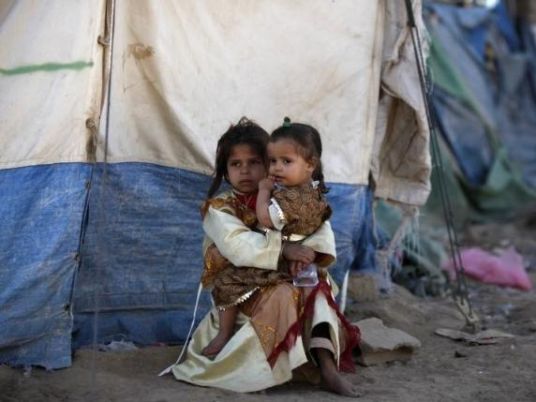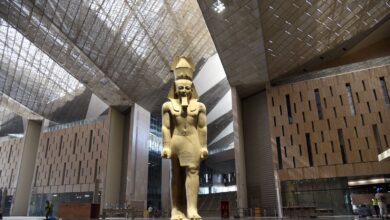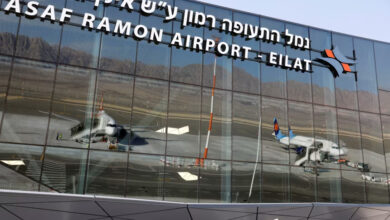
Yemeni refugees cheered and ululated as their plane dipped towards Aden, returning them to a precarious life in their home city three weeks after fighting there ended and months after most of them fled.
But for many refugees returning to a city without regular water or electricity and shattered by months of intense street fighting, the joy of being home was tempered by grief at the sight of destruction and uncertainty over the future.
"I can't believe it. I can't believe the damage," said Muheeb Ishaq quietly, gazing in horror at the ruined terminal building and the shredded remains of hangars.
His father, who was also on the flight, had to turn his face away with grief before saying: "Look what they did! I have known all this since I was born. It was a paradise."
Their flight from Jordan, one of the first by Yemen Airways to reach Aden, was paid for by the country's exiled government, part of its efforts to re-establish normality in the city after local fighters it backs ousted the northern-based Shi'ite Houthi militia in July.
The fighters, with military help from Gulf countries who are suspicious of the Houthis' ties to Iran, retook Aden's airport on July 17, a turning point in the civil war after four months of stalemate, and have since pushed further into southern Yemen.
On Monday the government of President Abd-Rabbu Mansour Hadi, who fled Aden in March for Riyadh, said groups it supports, backed by Gulf air strikes and arms, had retaken parts of Ibb province and were advancing in Abyan province, near Aden.
The Ishaqs, a prosperous middle class family, left Aden on an Indian navy ship for Djibouti on April 10 after tank shells and mortars started to fall near their home, abandoning some luggage on the quayside as sniper bullets sang overhead.
"Will there be electricity or water? I don't know," said Muheeb Ishaq, 35, sitting next to his sleeping son Mahbub, four, a suitcase and houseplant propped on the plane floor before him, while one-year-old Offa sat fussing on his mother's lap.
The family, including Muheeb's parents, siblings and their families, decided to return home despite such fears because of the hardships they faced as impoverished refugees, first in Djibouti and then in Jordan.
Natives of Aden, and quick to voice their love for the city and pride in the happy, successful lives they had forged there before the war, they said they were determined to rebuild.
Separatist anger
Out of the window, mountains, clifftop villages and terraced farms unfolded far below, but as the pilot announced the plane's impending arrival in Aden, it was not Yemen's national flag that passengers waved, but that of a southern separatist movement.
It showed how as the fighting continues and anger grows at the human cost, the civil war is no longer simply about who will rule Yemen, or to which regional power it will be allied, but over whether it can remain a country at all.
"We were just students and workers. Normal people. We liked playing soccer. But the Houthis came to kill. I fought just for Aden," said Alqadr Tawfiq, 22, a mechanical engineering student returning on the plane with his wife and infant son.
They left Aden by boat in early June after he was wounded following two months of fighting in which many of his fellow students and friends died, and which he described simply as "dirty days", showing a finger-long bullet wound on his flank.
He now hopes to rejoin the fighters pushing back the Houthis from Abyan, the last southern province in which they remain.
"We will liberate the south. The Houthis can go back north," he said.
That sentiment was shared by Mamoon Omar, 48, a British-Yemeni former airline pilot born in Zinjibar in Abyan and now living in Yorkshire, England. He returned to Yemen in February to help his disabled son, daughter-in-law and baby granddaughter escape.
He was unable to get his son's wife or the child British visas, however, and when the fighting in Aden grew too intense, they paid US$1,000 to be driven to the Omani border, through dozens of Houthi checkpoints and using rare supplies of petrol.
"After what the Houthis did, there is no way Yemen can stay united," he said.
Distress over ruined city
Such anger at the Houthis was only intensified by the sight of Aden's Khormaksar district as the plane descended, revealing entire neighborhoods of ruined, shell-pocked houses, as if hit by an earthquake.
Dozens of soldiers from the United Arab Emirates stood guarding the runway as the refugees disembarked and walked, towards the ruined terminal building past the shredded remains of hangars, gazing with horror at the destruction around them.
In a small room at the far end of the terminal, with no electricity and most of its ceiling missing, a man in striped shirt sat in a windowless booth stamping refugees' passports with one hand and speaking on a mobile phone with the other.
Above the baggage carousel, the remains of a portrait of Hadi flapped from a broken frame, only his shoulders and chin visible, the picture's cardboard backing and the tiled wall around it peppered with bullet holes.
A huge gash in the roof showed where a missile had struck.
At the terminal door a woman from the plane folded herself into the arms of a tall man and sobbed loudly, while her companions were greeted by female relatives in a flurry of hugs and kissing.
But, nearby, the sound of furious hammering revealed where workers in an adjacent area were starting to repair damaged parts of the airport, a first step towards the reconstruction of a ruined city.




